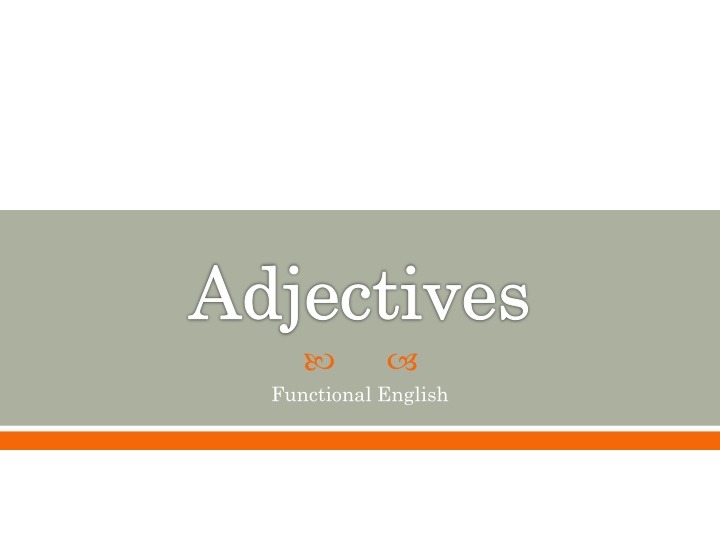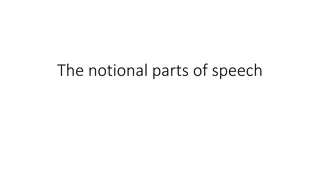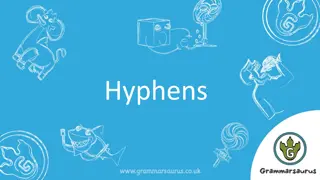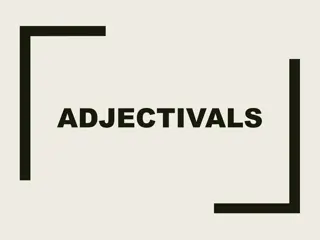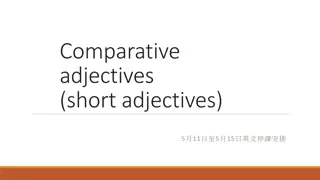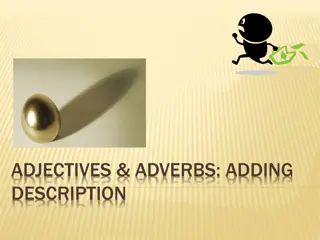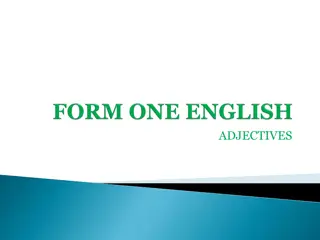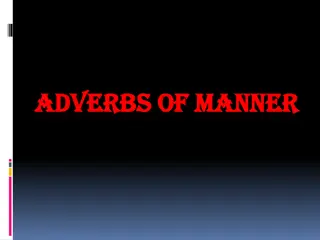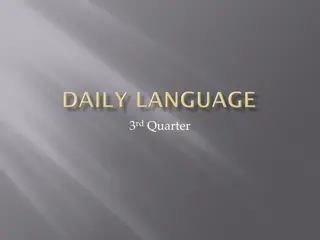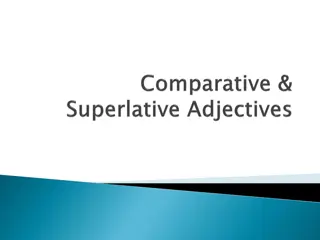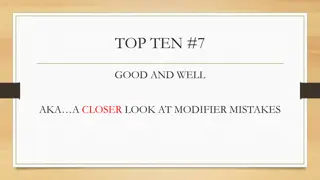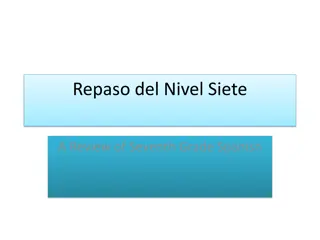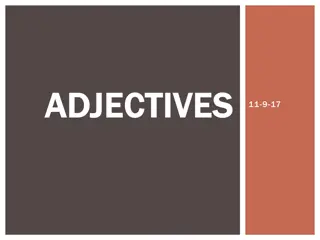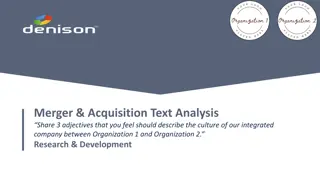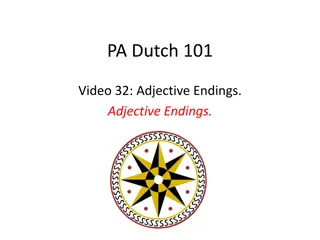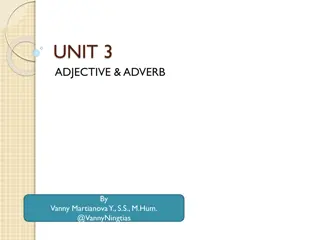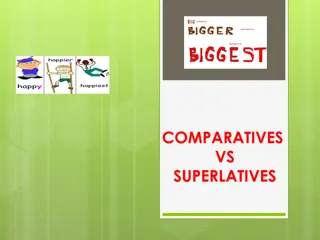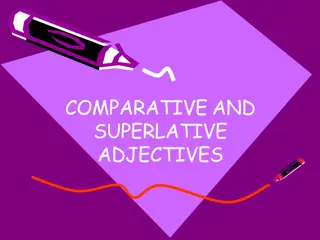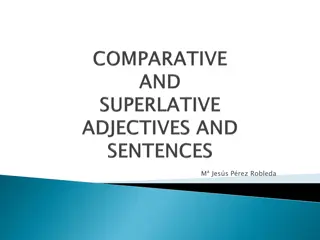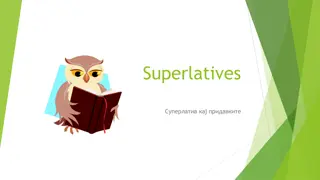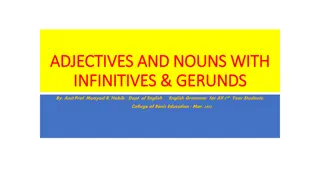Adjectives
Adjectives are essential elements in English language that enhance the meaning of nouns. They come in various types such as Adjective of Quality, Possessive Adjective, Distributive Adjective, Adjective of Quantity, Numeral Adjective, and Demonstrative Adjective. Each type serves a specific purpose in clarifying the characteristics or quantity of the noun it describes. By learning about the different types of adjectives and how they function in sentences, you can improve your English language skills significantly.
Download Presentation

Please find below an Image/Link to download the presentation.
The content on the website is provided AS IS for your information and personal use only. It may not be sold, licensed, or shared on other websites without obtaining consent from the author.If you encounter any issues during the download, it is possible that the publisher has removed the file from their server.
You are allowed to download the files provided on this website for personal or commercial use, subject to the condition that they are used lawfully. All files are the property of their respective owners.
The content on the website is provided AS IS for your information and personal use only. It may not be sold, licensed, or shared on other websites without obtaining consent from the author.
E N D
Presentation Transcript
Adjectives Functional English
What is Adjective? Adjectives are the words that are used with a noun to add something to its meanings
Use of Adjective in a Sentence An adjective can be used 1. attributively 2. predicatively For example the lazy boy was punished The boy is lazy
Types of Adjective 1. Adjective of Quality 2. Possessive Adjective 3. Distribuative Adjective 4. Adjective of Quantity 5. Numeral Adjective 6. Demonstrative Adjective 7. Interrogative Adjective 8. Proper Adjective
Adjective of Quality/Descriptive Adjectives that show the kind or quality of a peson or a thing eg. My freind is an honest person Karacahi is the largest city of Pakistan
Possessive Adjective Adjectives that are used to show possession for example this is my book
Distributive Adjective Adjectives which refer to each one of number. Words like each,every,either-or and neither-nor are used for these adjectives Everyone of you is expected to do his work. Either you or your classfellow will attend the party
Adjevtives of Quantity Adjevtives that show the quantity of noun are termed as adjevtives of quantity. For example I ate some rice He lost all his wealth
Numeral Adjevtive Adjectives showing how many persons or things are meant. For example Adjectives of number answer the question how many? They are further divided into: 1. Definite 2. Indefinite 3. distribuative
Demonstrative Adjective These adjectives point out which person or thing is meant. For example This pen is mine I hate such things Those rascal must be punished
Interrogative Adjective What,which,when,where when used with adjectives are called interrogative adjectives. For example which way shall we go? Whose book is this?
Proper Adjective Adjevtives formed from proper nouns are sometimes called as proper Adjectives eg. French wine, Turkish tobacco
How Adjectives are Formed? Many adjectives are formed from nouns like: Boy Boyish Care Careful Trouble Troublesome Gold Golden
Conti.... some adhectives are formed from verbs Tire Tireless Speech Speechless Talk Talkative Attract Attractive
Conti.... Some adjectives are formed from adjevtives Tragic Tragical Three Threefold Whole Wholesome
Place of Adjectives 1. adjectives used attribuatively are generally placed before the noun 2. in poetry adjectives are often followed by noun 3. when several adjectives are used for a single noun,they are placed after it 4. when a phrase is used with an adjective to explain its meanings,it is placed after noun 5. in some fixed phrases the noun comes after adjective for example time immemorial, God almighty
Formation of Comparative and Superlative degrees Most adjectives are formed by adding er and est at the end of the positive degrees. For example the adjectives of single syllables like bold,young,great Adjectives of two or more syllables are formed by adding more and most
Irregular Comparison Degrees of Adjectives that are not formed from positive form. For example good,bad,many etc
Adjectives as Nouns Sometimes the adjectives are used as nouns for example 1. as plural nouns denoting to a class 2. as singular nouns denoting to an abstract idea 3. nouns derieved from proper nouns or some denoting to persons for example indians,elders 4. in certain phrases like in future,in short,right or wrong etc
Exceptional Cases 1. some comparatives have lost their meanings and are used as positive degrees for example elder,inner,upper,outer 2. certian comparatives borrowed from latin don,t have positive degrees. They end in or and not in er for example interior,major,minor etc 3. these adjectives ending in or are followed by to and not than
Conti.... Adjectives that do not admit of different degrees can not be compared for example perfect,square,round and universal etc
Correct use of Some Adjectives 1. Later,Latter;Latest,Last 2. Elder,Oldr;Eldest,Oldest 3. Farther,Further 4. Nearest,Next 5. some,any 6. Each,every 7. Little,A little,the little 8. Few,a few,the few
Leter and latest Later and latest refer to time. For example i heard the latest news. He is later than i expected. Latter and Last These refer to place. For example our house is last in the street. The latter chapters are lacking in interest.
Elder and eldest Are used only for persons and not for animals or things. For example Ali is my elder brother. Older and oldest are used both for pesons and things. For example This is the oldest buliding of this city.
Farther and further Both are used to express distance but further is used in the meanings of additional too. Queta is further/farther from lahore. Please send application without further delay.
Nearest and Next Nearest refers to shortest distance. Next refers to sequence of things coming one after the other. This is the nearest market. My uncle lives next to my house.
Some/any To express quantity some is used in affirmative sentences and any in negative sentences. There is some milk in the glass. There is not any milk in the glass.
Each/Every Each and Every give same meanings but every is more strong. Each is used for two persons and every is used for more than two. Each one of these chair is broken. It rained everyday.
Little,a little,the little Little: not much,hardly any There is little hope of his recovery A little: some though not much A little knowledge is dangerous. The little: not much but all there is the little information he had was not quite reliable
